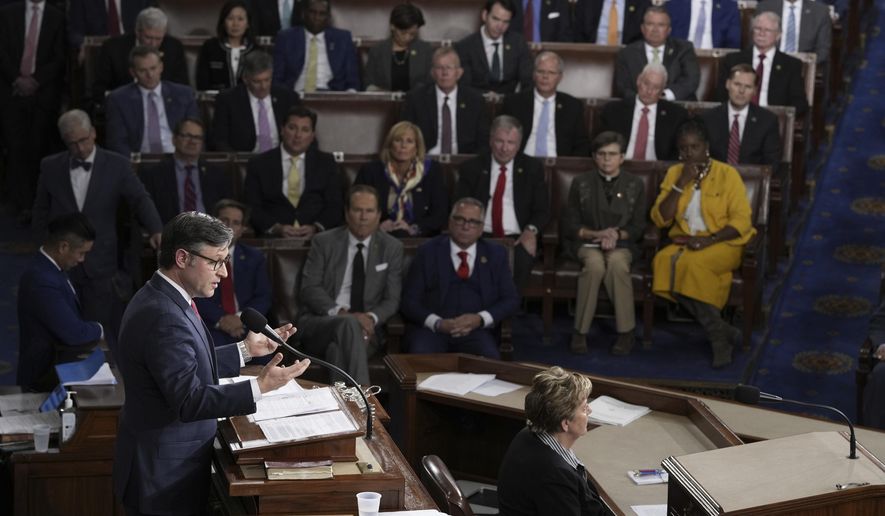House Speaker Mike Johnson’s $1.6 trillion federal budget agreement with President Biden and Democrats is fueling backlash from hardline conservatives, who say the recently installed leader is making the same missteps as his predecessor, Kevin McCarthy.
Mr. Johnson is likely to face defections from the House Freedom Caucus, home to more than three dozen of the chamber’s most conservative members, meaning he’ll again be forced to rely on a large number of Democrats to avert a partial shutdown over the next few weeks.
Incoming chair of the caucus Rep. Bob Good of Virginia, one of eight Republicans who led the removal of Mr. McCarthy as speaker last year, slammed the deal announced Sunday as “another loss for America.”
“Republicans agreeing to spending levels $69 billion higher than last summer’s debt ceiling ’deal,’ with no significant policy wins is nothing but another loss for America,” Mr. Good posted on social media. “At some point, having the House majority has to matter. Stop funding this spending with an open border!”
The Freedom Caucus’ official position was that the funding deal is a “total failure.”
The topline spending figure for the remainder of fiscal year 2024, which runs through Sept. 30, honors a McCarthy-Biden funding deal secured last year to raise the nation’s debt limit. But it presents major obstacles for Mr. Johnson with Republicans as Congress races to pass the legislation before a partial government shutdown on Jan. 19.
Conservatives take issue with what they call “Washington math.” The $1.59 trillion comes from $886 billion for defense and $704 billion for non-defense spending. But when an additional $69 billion side deal for non-defense domestic programs is included, which Mr. Biden and Mr. McCarthy had agreed to, the total figure is just under $1.66 trillion.
Mr. Johnson and his allies say their hands were largely tied because of the prior arrangement.
The side deal is offset by $16 billion in cuts that were secured by Mr. Johnson, but that critics say are inadequate. They include $6 billion in unspent pandemic-era funds and $10 billion in additional IRS cuts. Spending reductions totaling $20 billion to the IRS were previously agreed to by Mr. McCarthy and Mr. Biden, but the full amount will be implemented in 2024, rather than only $10 billion.
“Don’t let the swamp fool you. The ’bipartisan’ spending deal is a sham. The real topline is $1.658 trillion,” said Rep. Eric Burlinson, Missouri Republican. “Both parties are addicted to reckless spending, and it’s time we put a stop to it.”
Rep. Andy Biggs of Arizona, a former Freedom Caucus chairman, posted: “Sad to say but the spending epidemic in Washington continues with both parties being culpable.”
Russ Vought, former Trump White House budget director, blasted Mr. Johnson by posting a picture of a head of lettuce with the caption: “I think a lettuce could have negotiated a better deal.”
Mr. Johnson anticipated conservative criticism and attempted to get ahead of it. He acknowledged to Republicans in a letter announcing the agreement that “these final spending levels will not satisfy everyone, and they do not cut as much spending as many of us would like.”
Mr. Johnson also said the budget deal was tantamount to the first non-VA, non-defense spending reductions, though small, since fiscal year 2017.
“This represents the most favorable budget agreement Republicans have achieved in over a decade,” Mr. Johnson wrote.
The first shutdown deadline is Jan. 19 and the second is Feb. 2 as part of a two-part stopgap funding track that Congress passed in November.
The funding deal is separate from ongoing southern border security talks in the Senate that would be paired with a $110 billion national security package for Israel, Ukraine and Taiwan. But some House Republicans have threatened to oppose any government funding legislation unless stricter border security measures are finalized to stem the record flow of illegal crossings.
While Freedom Caucus members stew, other rank-and-file Republicans say Mr. Johnson had limited wiggle room with a Democratic-led Senate and Mr. Biden in the White House.
“Are we learning that negotiating with the Democrats in the White House and Senate with a slim majority is hard and you can’t get everything you want, no matter who is in the speaker’s office?” Rep. Mike Collins, Georgia Republican said.
Democrats, meanwhile, saw the bipartisan deal as a win against the Freedom Caucus.
Senate Majority Leader Charles E. Schumer took a victory lap Monday, reveling in having successfully rejected cuts to Democrats’ Inflation Reduction Act, as well as “painful and draconian cuts that the hard-right, particularly those in the Freedom Caucus, clamored for.”
• Ramsey Touchberry can be reached at rtouchberry@washingtontimes.com.




Please read our comment policy before commenting.